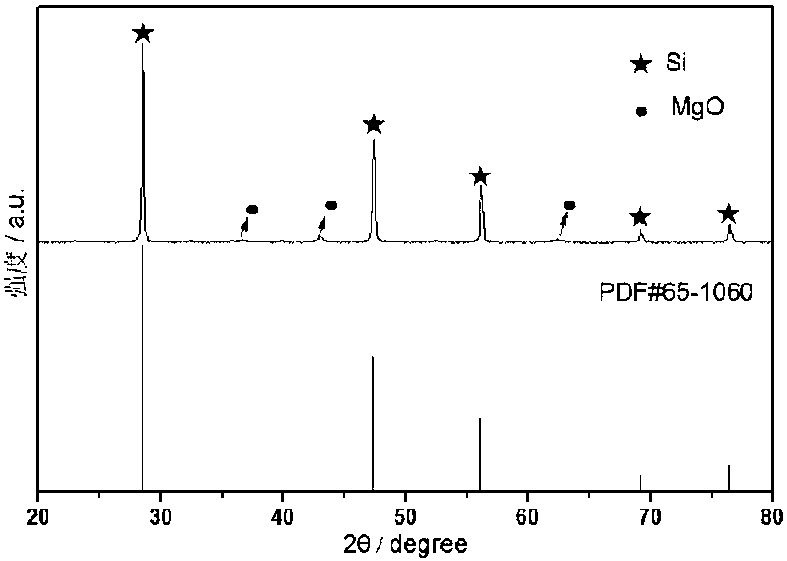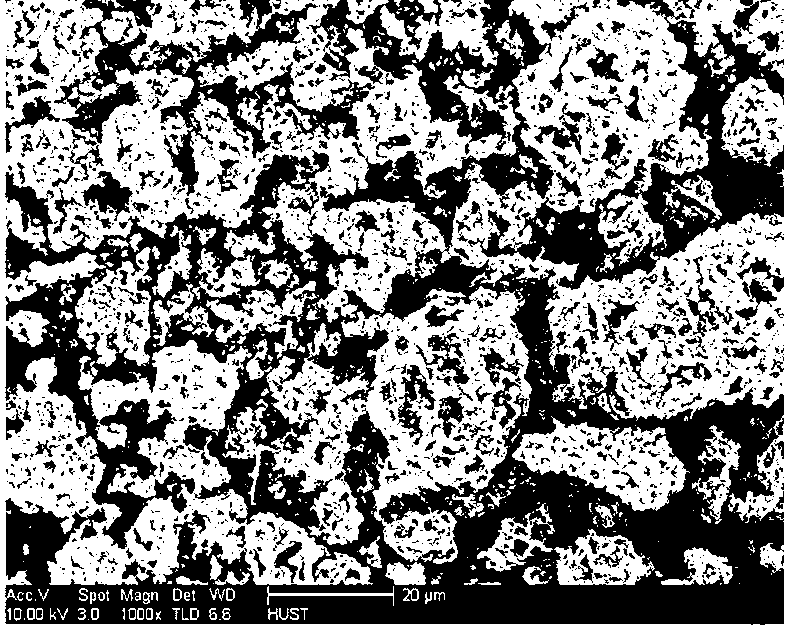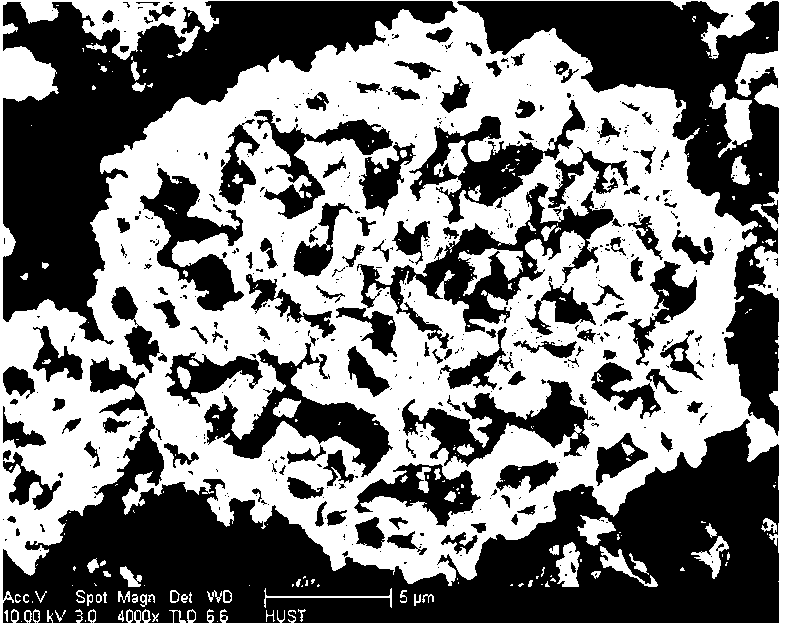Fluorine-free preparation method for three-dimensional porous silica powder anode material of lithium ion battery
A lithium-ion battery, three-dimensional porous technology, applied in the field of electrochemical power supply, can solve the problems of hydrofluoric acid toxicity and strong corrosiveness, and achieve the effects of improved material specific capacity and cycle stability, easy operation, and low material preparation cost
- Summary
- Abstract
- Description
- Claims
- Application Information
AI Technical Summary
Problems solved by technology
Method used
Image
Examples
Embodiment 1
[0042] Example 1. Prepare the lithium ion battery three-dimensional porous silicon powder anode material according to the preparation example method, set the decomposition temperature of magnesium silicide to 800° C., and other conditions are in accordance with the preparation example scheme. The obtained porous silicon material is prepared for the electrochemical test. The electrode preparation method, battery assembly and test conditions are the same as those in Comparative Example 1. The first lithium insertion capacity of the material is 2883.3mAh / g, the delithiation capacity is 1821.0mAh / g, and the coulombic efficiency is 63.2%. The 10th cycle has a lithium insertion capacity of 123.0mAh / g and a delithiation capacity of 119.0mAh / g, its capacity retention rate is 6.53%, and the capacity attenuation is large. The relatively pure nano-silicon electrode material has poor electrochemical performance. At this temperature, the decomposition of magnesium silicide is insufficient...
Embodiment 2
[0043] Example 2. The three-dimensional porous silicon powder anode material for lithium ion batteries was prepared according to the preparation example method, the decomposition temperature of magnesium silicide was set to 900° C., and the other conditions were in accordance with the preparation example scheme. The obtained porous silicon material is prepared for the electrochemical test. The electrode preparation method, battery assembly and test conditions are the same as those in Comparative Example 1. The material has a first lithium insertion capacity of 2007.8mAh / g, a delithiation capacity of 1185.0mAh / g, and a coulombic efficiency of 59.0%. The 10th cycle lithium insertion capacity was 529.6mAh / g, the delithiation capacity was 507.8mAh / g, and its capacity retention rate was 42.85%. After 70 cycles, the lithium insertion capacity is 211.7 mAh / g, the delithiation capacity is 214.0 mAh / g, and the capacity retention rate is 18.06%. Relatively pure nano-silicon electrode m...
Embodiment 3
[0044] Example 3. Prepare the lithium ion battery three-dimensional porous silicon powder anode material according to the preparation example method, set the decomposition temperature of magnesium silicide to 1000° C., and other conditions are in accordance with the preparation example scheme. The obtained porous silicon material is prepared for the electrochemical test. The electrode preparation method, battery assembly and test conditions are the same as those in Comparative Example 1. The first lithium insertion capacity of the material is 2184.1mAh / g, the first delithiation capacity is 1296.8mAh / g, and the coulombic efficiency is 59.4%. After 10 cycles, the material can still release a reversible capacity of 596.8mAh / g, and the capacity retention rate is 46.02%. After 70 cycles, its lithium insertion capacity is 261.0 mAh / g, its delithiation capacity is 258.2 mAh / g, and its capacity retention rate is 19.9%. The electrochemical performance of relatively pure nano-silicon e...
PUM
| Property | Measurement | Unit |
|---|---|---|
| electrical conductivity | aaaaa | aaaaa |
| current efficiency | aaaaa | aaaaa |
| current efficiency | aaaaa | aaaaa |
Abstract
Description
Claims
Application Information
 Login to View More
Login to View More - R&D Engineer
- R&D Manager
- IP Professional
- Industry Leading Data Capabilities
- Powerful AI technology
- Patent DNA Extraction
Browse by: Latest US Patents, China's latest patents, Technical Efficacy Thesaurus, Application Domain, Technology Topic, Popular Technical Reports.
© 2024 PatSnap. All rights reserved.Legal|Privacy policy|Modern Slavery Act Transparency Statement|Sitemap|About US| Contact US: help@patsnap.com










